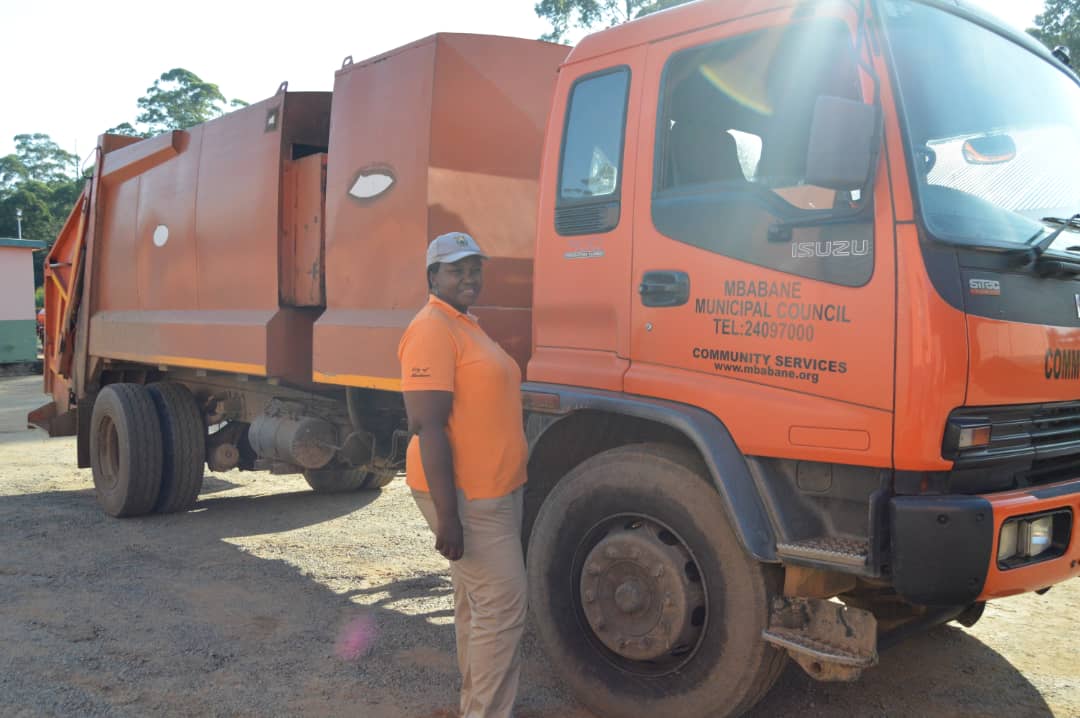For a while I had heard people say they had seen a lady driving one of the municipality’s refuse trucks around Mbabane. I was quite surprised to hear this because up until that point I had assumed that it was only men who drove those heavy duty vehicles. This is hardly surprising given that the country has only one female refuse truck driver — Londile Malambe.
Londile’s Story
Born and bred in Mbabane, the mother of three began working for the municipality in 2007 though not as a truck driver, but as a cleaner. Growing up Londile (39) relates that she had a knack for electronics and fixing things, but with a daughter to care for (whom she had whilst doing Form three) Londile was keen to take any work that came by her way. Prior to joining the municipality she had worked for Shoprite and Jet.
On what motivated her to want to drive a truck, she recalls attending the Southern Africa Inter-municipal games in Tzaneen and seeing a “short and tiny” lady emerge from a bus on the driver’s side. Despite her initial shock, Londile felt inspired to also give heavy duty driving a go. “If she can drive a bus, then I can also do it.” The next year, in 2011, Londile set out to obtain a heavy duty driver’s license. However she fell pregnant with her second daughter and had to put the plan on hold, but in 2013 she resumed her plan. Amazingly, she completed her training in two weeks. She says for the most part it was about mastering the size of the vehicle. Prior to acquiring the heavy duty license she had already obtained her light duty driver’s license in 2008.
Londile admits that when she did her heavy duty training she didn’t do it with the intention of being hired at the municipality. Rather she had come across an advert from UNITRANS Swaziland that was calling on women to apply for a truck training course, which got Londile imagining herself behind the wheel of a truck. The initiative helped the company secure five female drivers who operate trucks ferrying litres of fuel between South Africa and Eswatini.
Opportunity Knocks
In 2014, the municipality advertised positions for refuse truck drivers. Initially Londile didn’t jump at this opportunity as she felt a bit unsure of her capabilities given that she had just recently acquired her heavy duty driver’s license. However one of her co-workers urged her to apply — going as far as bringing the job advert to her home as she was on leave during that time. He further mentioned that history could be made if indeed she was hired.
During the interview and testing process Londile recalls that she was the only lady amongst four men and was the last one to be tested. Up until that point, Londile says she had been practising her driving with the assistance of her co-workers who were already driving heavy duty vehicles. Proving how eager she was to practice and hone this skill she says, “I practised with all the vehicles I could get my hands on.” On the day of the testing her co-workers even called her to give her more tips on what she should do. “I had so much support, especially from the guys I work with.They were just so supportive.”
Londile started driving the refuse truck for the Municipality of Mbabane in 2014. A ground-breaking move that showed that women have a role to play in operating heavy duty vehicles in a waste management environment. In South Africa there is even a move by waste management companies to open up more opportunities for female truck drivers. It is hoped that such initiatives will address the gender imbalances and lack of diversity that is apparent in the heavy duty driving industry.
Behind the Big Wheel
Londile who mainly drives a Skip master (a truck that is used for commercial collection operations) relates how she enjoys her job, and it is evident that she has a passion for heavy duty driving. The job even comes with the employee benefit of medical aid. She says one of the perks of driving such a big vehicle is that one gets to enjoy a better view of the road, thus making it easier to navigate traffic. Londile has become so adept at driving the truck that she has no trouble parallel parking in town.
On the other skills that are needed for the job, Londile says one must be good at calculating because the driver has to measure the time it will take the loader to jump off the truck, pick up the refuse bags and load them at the back. Furthermore she explains how calculation helps a driver establish how to best turn a corner, because a miscalculation could result in a truck climbing onto a pavement. And most importantly one has to be confident in themselves — such a mindset is clearly important as there’s no room for error in this game.
Public Responce
Given that she is in a field dominated by men, I’m eager to know what type of responses she gets from the public. She relates how she gets a range of responses: “People just stop and stare. Some of the guys bashaya tinkhwela, labhanye bayakhuta…they’re like ‘Wow, really!’” As Londile mentions in the video, some guys will even climb in and inspect the vehicle to see if it’s really a manual and not an automatic. Imagine their shock when they see that she is driving an 8-gear manual transmission vehicle! She also gets lots of praises from other women who see her as a beacon of women empowerment and men sometimes jokingly say that she is taking their job.
However she does encounter negativity from time to time. There was a time when it came from those whom she worked with who doubted her capabilities. She sometimes also has to contend with uncooperative bus and kombi drivers when picking up the bins around town. Add to that, some men even take umbrage at the fact that she may overtake them on the road. But she also points out that not all men are like that and some applaud her and even praise her driving skills.
Last Words
Londile has ambitions of obtaining a Code 14 truck driver’s license so that she can drive the larger trucks. With many women being hesitant with entering fields that are dominated by men, I hope Londile’s story proves that nothing should stop Swazi women from doing jobs that are deemed too masculine. As a word of advice, she encourages other women to “face their fear and to look beyond themselves.” To show that facing one’s fear is something she believes in, Londile says she’s encouraging her eldest daughter to go bungee-jumping in order to help her overcome her fear of heights. Well that’s definitely one way to face your fear!


